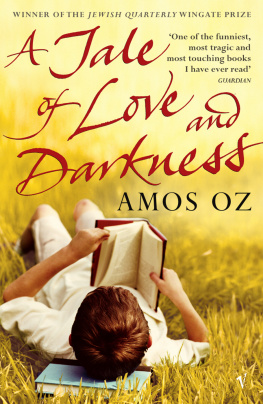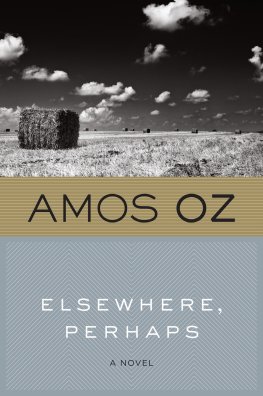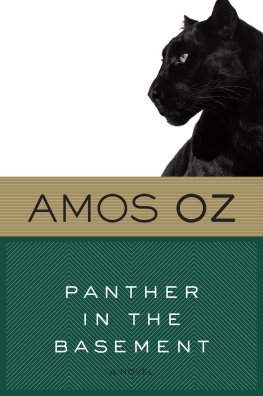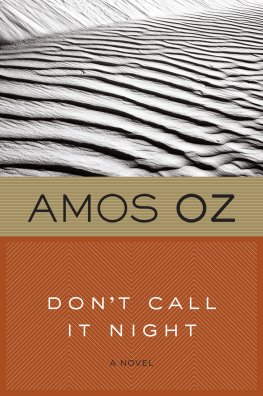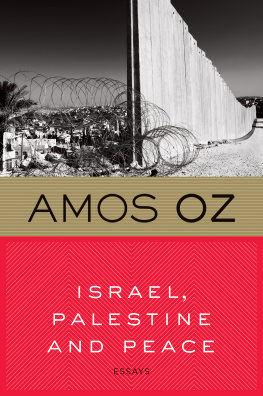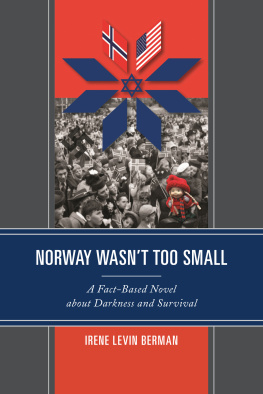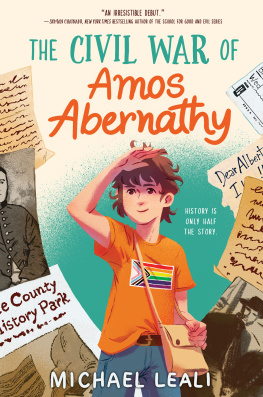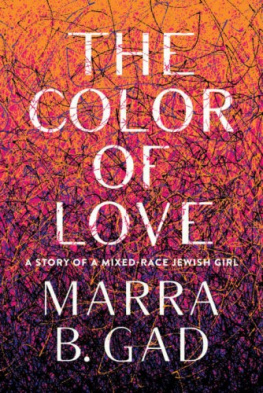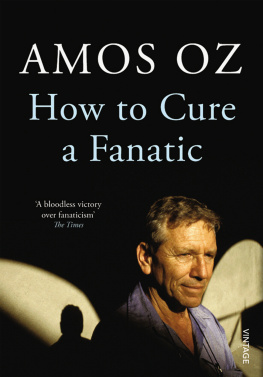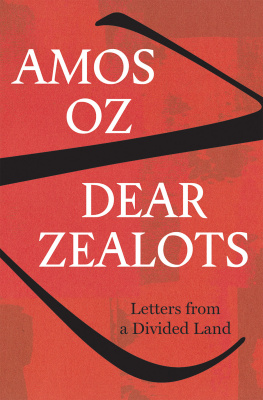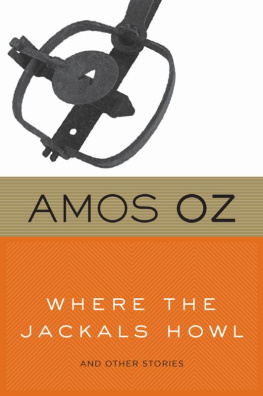About the Authors
Born in Jerusalem in 1939, Amos Oz is the internationally acclaimed author of many novels and essay collections, translated into thirty languages. His novels include My Michael, Black Box, To Know a Woman and most recently The Same Sea. He has received several international awards, including the Prix Fmina, the Israel Prize and the Frankfurt Peace Prize. He lectures in literature at the Ben Gurion University of the Negev. He is married with two daughters and a son, and lives in Arad, Israel.
Nicholas de Lange, the translator, is a professor at the University of Cambridge and writes on a variety of subjects. He has won many prizes for his translations.
About the Book
Love and darkness are just two of the powerful forces that run through Amos Ozs extraordinary, moving story. He takes us on a seductive journey through his childhood and adolescence, along Jerusalems war-torn streets in the 1940s and 50s, and into the infernal marriage of two kind, well-meaning people: his fussy, logical father, and his dreamy, romantic mother. Caught between them is one small boy with the weight of generations on his shoulders. And at the tragic heart of the story is the suicide of his mother, when Amos was twelve-and-a-half years old.
Ozs story dives into 120 year of family history and paradox, the saga of a Jewish love-hate affair with Europe that sweeps from Vilna and Odessa, via Poland and Prague, to Israel. Farce and heartbreak, history and humanity make up this magical portrait of the artist who saw the birth of a nation, and came through its turbulent life as well as his own. This is a memoir like no other, and one that cries out to be read and wept over.
ALSO BY AMOS OZ
Fiction
My Michael
Elsewhere, Perhaps
Touch the Water, Touch the Wind
Unto Death
The Hill of Evil Counsel
Where the Jackals Howl
A Perfect Peace
Black Box
To Know a Woman
Fima
Dont Call It Night
Panther in the Basement
The Same Sea
Non-Fiction
In the Land of Israel
The Slopes of Lebanon
Under this Blazing Light
Israel, Palestine and Peace
Help Us To Divorce
For Children
Soumchi
1
I WAS BORN and bred in a tiny, low-ceilinged ground-floor flat. My parents slept on a sofa bed that filled their room almost from wall to wall when it was opened up each evening. Early every morning they used to shut away this bed deep into itself, hide the bedclothes in the chest underneath, turn the mattress over, press it all tight shut, and conceal the whole under a light grey cover, then scatter a few embroidered oriental cushions on top, so that all evidence of their nights sleep disappeared. In this way their bedroom also served as study, library, dining room and living room.
Opposite this room was my little green room, half taken up with a big-bellied wardrobe. A narrow, low passage, dark and slightly curved, like an escape tunnel from a prison, linked the little kitchenette and toilet to these two small rooms. A faint light-bulb imprisoned in an iron cage cast a gloomy half-light on this passage even during the daytime. At the front both rooms had just a single window, guarded by metal blinds, squinting to catch a glimpse of the view to the east but seeing only a dusty cypress tree and a low wall of roughly dressed stones. Through a tiny opening high up in their back walls the kitchenette and toilet peered out into a little prison yard, surrounded by high walls and paved in concrete, where a pale geranium planted in a rusty olive can was gradually dying for want of a single ray of sunlight. On the sills of these tiny openings we always kept jars of pickled gherkins and a stubborn cactus in a cracked vase that served as a flower pot.
It was actually a basement flat, as the ground floor of the building had been hollowed out of the rocky hillside. This hill was our next-door neighbour, a heavy, introverted, silent neighbour, an old, sad hill with the regular habits of a bachelor, a drowsy, wintry hill, that never scraped the furniture or entertained guests, never made a noise or disturbed us, but through the party walls there seeped constantly towards us, like a faint yet persistent musty smell, the cold, dark silence and dampness of this melancholy neighbour of ours.
Consequently right through the summer there was always a hint of winter in our home.
Visitors would say: its always so pleasant here in a heatwave, so cool and fresh, really chilly, but how do you manage in the winter? Dont the walls let in the damp? Dont you find it depressing?
*
Books filled our home. My father could read in sixteen or seventeen languages, and could speak eleven (all with a Russian accent). My mother spoke four or five languages and read seven or eight. They conversed in Russian or Polish when they did not want me to understand. (Which was most of the time. When my mother referred to a stallion in Hebrew in my hearing my father rebuked her furiously in Russian: Shto s toboy?! Vidish malchik ryadom s nami! Whats the matter with you? You can see the boys just there!) Out of cultural considerations they mostly read books in German or English, and they presumably dreamed in Yiddish. But the only language they taught me was Hebrew. Maybe they feared that a knowledge of languages would expose me too to the blandishments of Europe, that wonderful, murderous continent.
On my parents scale of values, the more western something was the more cultured it was considered. For all that Tolstoy and Dostoevski were dear to their Russian souls, I suspect that Germany despite Hitler seemed to them more cultured than Russia or Poland, and France more so than Germany. England stood even higher on their scale than France. As for America, there they were not so sure: after all, it was a country where people shot at Indians, held up mail trains, chased gold and hunted girls.
Europe for them was a forbidden promised land, a yearned-for landscape of belfries and squares paved with ancient flagstones, of trams and bridges and church spires, remote villages, spa towns, forests and snow-covered meadows.
Words like cottage, meadow or goose-girl excited and seduced me all through my childhood. They had a sensual aroma of a genuine, cosy world, far from the dusty tin roofs, the urban wasteland of scrap iron and thistles, the parched hillsides of our Jerusalem, suffocating under the weight of white-hot summer. It was enough for me to whisper to myself meadow, and at once I could hear the lowing of cows with little bells tied round their necks, and the burbling of brooks. Closing my eyes I could see the barefoot goose-girl, whose sexiness brought me to tears before I knew about anything.
*
With the passage of the years I became aware that Jerusalem, under British rule in the nineteen-twenties, thirties and forties, must be a fascinatingly cultured city. It had big businessmen, musicians, scholars and writers: Martin Buber, Gershom Scholem, S.Y. Agnon, and a host of other eminent academics and artists. Sometimes as we walked down Ben Yehuda Street or Ben Maimon Avenue my father would whisper to me: Look, there is a scholar with a world-wide reputation. I did not know what he meant. I thought that having a world-wide reputation was somehow connected with having weak legs, because the person in question was often an elderly man who felt his way with a stick and stumbled as he walked along, and wore a heavy woollen suit even in summer.
The Jerusalem my parents looked up to lay far from the area where we lived: it was in leafy Rehavia with its gardens and its strains of piano music, it was in three or four cafs with gilded chandeliers in the Jaffa Road or Ben Yehuda Street, in the halls of the YMCA or the King David Hotel, where culture-seeking Jews and Arabs mixed with cultivated Englishmen with perfect manners, where dreamy, long-necked ladies floated in evening dresses, on the arms of gentlemen in dark suits, where broad-minded Britons dined with cultured Jews or educated Arabs, where there were recitals, balls, literary evenings,

